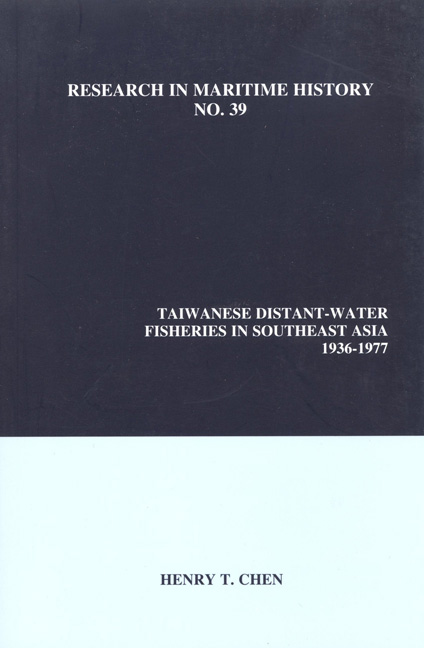Book contents
- Frontmatter
- Contents
- List of Tables
- List of Illustrations
- Notes on the Sources
- About the Author
- Acknowledgements
- Introduction
- Chapter 1 Japan and the Development of Taiwan's Fishing Industry
- Chapter 2 The Revival of the Fishing Industry in Postwar Taiwan
- Chapter 3 Kaohsiung Fishing Port and Its Fishing Ancillary Industries
- Chapter 4 The Taiwanese Fishing Industry and the Military-Political Complex
- Chapter 5 The Kaohsiung Fishing Industry and Its Ancillary Industries
- Chapter 6 The Development of Kaohsiung's Fishing Companies
- Chapter 7 Daily Lives at Sea, Fishing Zones and Politics
- Chapter 8 The Culture and Daily Life of the Kaohsiung Fishing Communities
- Chapter 9 The 1970s Crisis in the Taiwanese Fishing Industry
- Conclusion
- Appendix 1 List of Informants
- Select Bibliography
Chapter 9 - The 1970s Crisis in the Taiwanese Fishing Industry
- Frontmatter
- Contents
- List of Tables
- List of Illustrations
- Notes on the Sources
- About the Author
- Acknowledgements
- Introduction
- Chapter 1 Japan and the Development of Taiwan's Fishing Industry
- Chapter 2 The Revival of the Fishing Industry in Postwar Taiwan
- Chapter 3 Kaohsiung Fishing Port and Its Fishing Ancillary Industries
- Chapter 4 The Taiwanese Fishing Industry and the Military-Political Complex
- Chapter 5 The Kaohsiung Fishing Industry and Its Ancillary Industries
- Chapter 6 The Development of Kaohsiung's Fishing Companies
- Chapter 7 Daily Lives at Sea, Fishing Zones and Politics
- Chapter 8 The Culture and Daily Life of the Kaohsiung Fishing Communities
- Chapter 9 The 1970s Crisis in the Taiwanese Fishing Industry
- Conclusion
- Appendix 1 List of Informants
- Select Bibliography
Summary
The late 1970s was a crucial period for Taiwan's distant-water fishing industry as the traumatic effects of a variety of serious problems were manifested simultaneously. Some of the problems were not preventable. The acute labour shortage in the distant-water industry, the energy crisis of 1973 and Taiwan's diplomatic isolation which led to the failure of cooperation arrangements in the international fisheries were three key examples. Some problems, however, were caused by the short-sightedness of Taiwanese business culture. The rapid depletion of regional marine resources and the relatively small scale of the fishing companies and their financial fragility were two important adverse consequences that the Taiwanese vessel owners brought upon themselves. While these problems developed over time, they came to a head in the late 1970s when the 200-mile Exclusive Economic Zone (EEZ) was claimed by increasing numbers of coastal nations.
Labour Shortage
In the 1940s and 1950s young fishers were forced by economic circumstances to bear the ill-treatment and loneliness of the sea because for most of them working on a distant-water vessel was the only way to make a living. In the 1970s, however, numerous job opportunities created by onshore economic activities in the metropolitan areas, particularly in Taipei and Kaohsiung, encouraged young people to leave the fishery. In 1973, a novice fisher working on a distant-water vessel earned an average of NT $3000-7000 (US $79-184) per month, which was not much better than the salary that a young man could make in an onshore factory. Hence, in that year thirty-eight percent of the distant-water fishers quit; in 1974 fifty-two percent left; and in 1975 sixty-five percent abandoned their jobs at sea. The employment situation continually deteriorated over time.
Before the 1970s, getting a position on a vessel was quite competitive. In addition to having a good relationship with the fishing master, fishers had to be industrious, skilful and obedient. By the 1970s, however, this was no longer the case because working at sea was not as attractive a vocation as before. Those who had even a slight knowledge of the fishery cóuld now work in key staff positions. As for ordinary fishers, the companies could no longer expect them to be knowledgeable about fishing techniques. Some fishers were fugitives or ex-convicts. The lack of seafaring ability and navigational experience forced new fishers to rely heavily on modern technological devices.
- Type
- Chapter
- Information
- Taiwanese Distant-Water Fisheries in Southeast Asia, 1936–1977 , pp. 167 - 186Publisher: Liverpool University PressPrint publication year: 2009



